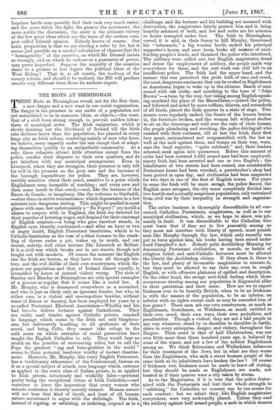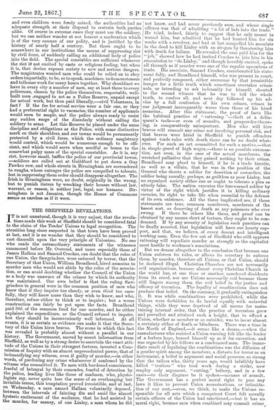THE RIOTS AT BIRMINGHAM.
SE Riots at Birmingham reveal, not for the first time, THESE new danger and a new want in our social organization. The danger is the presence in our midst of a population not yet assimilated to us in manners, ideas, or objects,—the want, that of a civil force strong enough to prevent sudden infrac- tions of municipal order. The Irish emigration, which is slowly draining out the life-blood of Ireland till the birth rate declines faster than the population, has planted in every large city an Irish colony, consisting mainly of men who have, we believe, every capacity under the sun except that of adapt- ing themselves quietly to an antipathetic community. As a rule, these colonists attract little attention except from the police, confine their disputes to their own quarters, and do not interfere with any municipal arrangement. Even in Liverpool, where they are strongest, their presence is only felt for evil in the pressure on the poor rate and the increase of the borough expenditure for police. They are, however, terribly sensitive about their creed, sensitive to a point which Englishmen seem incapable of reaching ; and every now and then some insult to that creed,—real, like the lectures of the Baron de Cumin; or imaginary, like the welcome to Garibaldi, —stirs them to active remonstrance, which degenerates in a few minutes into dangerous rioting. This might be quelled in most places with ease, but unfortunately a "No Popery 1" cry is still a charm to conjure with in England, the Irish are detested for their practice of lowering wages, and despised for their contempt of English comfort,—a being who goes barefoot stands, in English eyes, thereby condemned,—and after an hour or two of angry doubt, English Protestant fanaticism, which is to Catholic fanaticism as the roar of a blast furnace to the crack- ling of thorns under a pot, wakes up to wrath, and our decent, orderly, dull cities become like Limerick or Belfast. It is a civil war which breaks out in our streets, though not fought out with muskets. Of course the moment the English rise the Irish are beaten, as they have been all through his- tory, and the evil dislike of their own countrymen, which dis- graces our population and that of Ireland almost equally, is intensified by hours of mutual violent wrong. The riots of Sunday and Monday at Birmingham are only special examples of a process so regular that it seems like a social law. A Mr. Murphy, who is denounced everywhere as a scoundrel, and who is just as likely only an ignorant fanatic, but who, in either case, is a violent and unscrupulous brawler, without sense of fitness or decency, has been employed for years by a so-called Protestant Electoral Association—Whalley and his bad lot—to deliver lectures against Catholicism. They are really mad tirades against Catholic priests, couched in language which seems to the Irish not only blasphem- ous, but deliberately insulting to all professors of their creed, and being Celts, they cannot take refuge in the cold scorn on which centuries of social persecution have taught the English Catholics to rely. They would bear an attack on the practice of reverencing relics, but to call the Pope the greatest " rag and bone-grubber in the world " seems to them personal insolence worthy of instant chastise- ment. Moreover, Mr. Murphy, like every English Protestant, has a traditionary abhorrence of the Confessional, fastens on it as a special subject of attack, uses language which, extreme as applied to the worst class of Italian priests, is, as applied to Irish priests, notoriously and wickedly false,—personal purity being the exceptional virtue of Irish Catholics,—and contrives to leave the impression that every woman who attends confession is thereby morally stained Human nature will not bear that kind of insult, and least of all human nature accustomed to argue with the shillelagh. The Irish, instead of arguing, or satirizing, or indicting, respond as to a
challenge, and the lecturer and his building are menaced with destruction, the magistrates faintly protect him and it, being heartily ashamed of both, and law and order are for minutes. or hours trampled under foot. The Irish in Birmingham vowed, it is said, in their frenzy to kill Murphy, threatened. his "tabernacle," a big wooden booth, sacked his principal;
supporter's house, and once loose, broke all manner of unof- fending people's heads, and thrashed the police who interfered._ The military were called out, but English magistrates dread: and detest the employment of soldiery, the people made way everywhere for them, and the real work was still left to an insufficient police. The Irish had the upper hand, and the- instant this was perceived the pride both of race and creed,_ the most dangerous sentiment that can be evoked in Englishmen or Americans, began to wake up in the citizens. Bands of men armed with oak sticks, and marching to the tune of "John Brown"—a tune, by the way, fast taking among English-speak-- ing mankind the place of the Marseillaise,—joined the police, and followed and aided by mere ruffians, thieves, and scoundrels- of all kinds, placed the Irish quarter in a state of siege. Two streets were regularly sacked, the fronts of the houses beaten in, the furniture broken, and the women left without shelter• to sit on the doorsteps and wail over the ruin of their homes, the people plundering and wrecking, the police driving all who resisted with their cutlasses, till at last the Irish, their first fury spent, outnumbered and outgeneralled, with the law as well as the mob against them, and troops on their way, were, says the local reporter, "quite subdued," and, their leaders arrested, sank again into quiescence. Before this amount of order had been restored 1,025 armed men had been employed, ninety Irish had been arrested and one or two English ; the- inhabitants of two streets had been ruined, one considerable Protestant house had been wrecked, a pawnbroker's shop had been gutted in open day, and civilization had been suspended for two days in one of the first of English towns. For years" to come the Irish will be more savage, the police fiercer, the- English more arrogant, the city more completely divided into• two hostile and mutually suspicious populations, only restrained from civil war by their inequality in strength and organiza- tion.
The entire business is thoroughly discreditable to all con- cerned, Catholics, Protestants, magistrates, as well as to our municipal civilization, which, as we hope to .show, was pri- marily in fault. It was discreditable to the Catholics, who- must learn that if they are to live peaceably among us, they must not interfere with liberty of speech, must punish men like Murphy through the law, which only recently was. put in force against him, his books having been seized under Lord Campbell's Act. Nobody pelts Archbishop Manning for- denouncing Protestant civilization, or morals, or habits of religious belief, and anti-Catholic lecturers must be allowed the liberty the Archbishop claims. If they abuse it, there is. the law, and plenty of favourable magistrates to execute it, but they must be allowed to say their say, even in rough. English, or with offensive plainness of epithet and description.- On the other hand, the savage anti-Irish feeling which these occurrences develop among our population is disgraceful alike- to their patriotism and their sense. How are we to expect" Irishmen ever to be heartily British, when to be an Irishman is, with the masses of the population, to be an inferior, an inferior with no rights except such as may be conceded him of free grace V These men are our own countrymen, as much as. Englishmen, Scotchmen, or Welshmen, as much entitled to their own creed, their own ways, their own prejudices, and peculiarities. Though a violent, they are not a bad people in any way whatever, stand by us shoulder to shoulder in battle, share in every enterprise, danger, and victory, throughout the Empire. Their creed is that of half Christendom, was our- own little more than three hundred years ago, is believed by some of the wisest, and not a few of the noblest Englishmen among us. We think Bohemians and Wallachians infamous- for their treatment of the Jews, but in what are they worse- than the Englishmen, who sack a street because people of the same faith as its inhabitants have broken the law ? Of course- if Irishmen riot, Irishmen must be made to leave off rioting, but they should be made as Englishmen are made, not treated as if their quarter were a city taken by storm.
As to the Magistrates, if it is true that the police frater- nized with the Protestants and lent their whole strength te " subduing " the Catholics, no censure can be too severe for" such conduct ; but we admit they, like English magistrates everywhere, were very awkwardly placed. Unless they used' the soldiery against 'half armed people, a mob in which women, and even children were freely mixed, the authorities had no adequate strength at their disposal to restrain both parties alike. Of course in extreme cases they must use the soldiery, but we can neither wonder at nor lament a moderation which is of the very essence of our polity, and is justified by the history of nearly half a century. But there ought to be somewhere in our institutions the means of suppressing riot by civil force, of suddenly calling an additional body of police into the field. The special constables are sufficient whenever the riot id not excited by caste or religious feeling, but when it is, that device exposes society to new and serious dangers. The magistrates wanted men who could be relied on to obey orders impartially, to be, so to speak, machines, to do monotonous and toilsome work for many hours together. Why should not we have in every city a number of men, say at least three to every policeman, chosen by the police themselves, respectable, well- built men ,engaged to act as a Police Reserve, unpaid except for actual work, but-then paid liberally,—civil Volunteers, in fact I If the fee for actual service were a fair one, or they had a preferential right to vacancies, the number of applicants would soon be ample, and the police always ready to resist any sudden surge of the disorderly without calling the soldiery to arms. Let this Reserve be placed under the same discipline and obligations as the Police, with some distinctive mark on their shoulders, and our towns would be permanently proteeted by a civil force, which the ordinary magistracy would control, which would be numerous enough to be effi- cient, and which would serve when needful as bones to the somewhat pulpy mass of the special constables. As it is, any
riot, however small, baffles the police of our provincial towns, —soldiers are called out at Guildford to put down a Guy Fawkes row, and whole streets in Birmingham are surrendered to roughs, whose outrages the police are compelled to tolerate, lest in suppressing them order should disappear altogether. The
Irish in Birmingham were, no doubt, originally in the wrong, but to punish rioters by wrecking their houses without law, warrant, or reason, is neither just, legal, nor humane. Bir- mingham is not Jamaica, though the House of Commons seems as careless as if it were.































 Previous page
Previous page